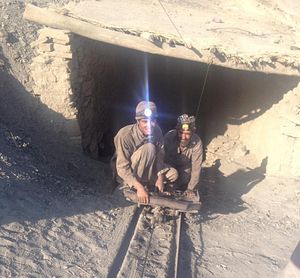QUETTA, BALOCHISTAN – Their faces covered with a black layer of coal dust, three laborers are on the crackling sled loaded with coal coming out from the Pakistan Minerals Development Corporation mine in Suranj, part of the tough mountainous terrain to the east of Quetta, the capital city of Balochistan province. Thousands of these laborers risk their lives every day in rathole-like mines across the province.
The China-Pakistan Economic Corridor (CPEC), a multibillion dollar project, will be passing through Balochistan while connecting Pakistan’s Gwadar port to Kashgar in China’s Xinjiang region. The Pakistani government has talked up CPEC as “game changing” in terms of providing employment and services to the people of Pakistan. But so far, distant hopes of employment haven’t stopped thousands of youths from opting for the tough labor of coal mining. Balochistan province possesses huge reserves of coal in the Dukki, Quetta, Harnai, Ziarat, Luni Chamalang, and Mach regions. Many of the mines seeking to capitalize on those resources are underregulated or downright illegal.
In Balochistan’s mines there were “68 deaths reported last year,” says Muhammad Zameer, secretary general of the Pakistan Mines Workers Federation. “Several of the deaths caused by mining are not reported by the press because the greater number of people are working in these mines illegally – without a safe atmosphere, equipment, and government checks on functioning mines.” Since the start of 2019 some four workers have lost their lives in Luni Chamalang and four others in Dukki district, according to Zameer.
Coal mining has historically been fraught with dangers, which are similar to those associated with the aftermath of natural disasters – suffocation, gas poisoning, injury or death should the mine’s roof collapse, as well as gas explosions when untrained and unregistered workers enter dangerous zones for mining. According to a government official, who requested anonymity because they were not authorized to talk to the press, more than 100,000 people work in coal mines across the province. The majority are from Afghanistan, Balochistan, and the neighboring Khyber Pakhtunkhwa province.





























